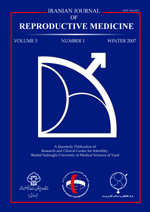
|
International Journal of Reproductive BioMedicine
Research and Clinical Center for Infertility, Shahid Sadoughi University of Medical Sciences of Yazd
ISSN: 1680-6433
EISSN: 1680-6433
Vol. 11, No. 7, 2013, pp. 577-582
|
 Bioline Code: rm13072
Bioline Code: rm13072
Full paper language: English
Document type: Research Article
Document available free of charge
|
|
|
International Journal of Reproductive BioMedicine, Vol. 11, No. 7, 2013, pp. 577-582
| en |
Zinc therapy improves adverse effects of long term administration of copper on epididymal sperm quality of rats
Babaei, Homayoon & Abshenas, Jalil
Abstract
Background: Industrial copper ingest is a common form of poisoning in animals. Zinc has an important role in the physiology of spermatozoa, in sperm production and viability.
Objective: This study was set to investigate whether the adverse effects of long term copper consumption on quality of rat spermatozoa could be prevented by zinc therapy.
Materials and Methods: Forty eight mature (6-8 weeks old) male rats were randomly allocated to either control (Cont, n=12) or three treatment groups each containing twelve animals. Animals in the first treatment group was gavaged with copper sulfate, the second treatment group was injected with zinc sulfate, and the third treatment group was given combined treatment of copper and zinc. Control animals received normal saline using the same volume and similar methods. Six rats from each group were sacrificed on day 28 and 56 after treatments for sperm quality evaluations.
Results: In spite of testicular weight reduction 56 days after copper consumption in comparison to the control group (p=0.002), there was not a significant difference between the control and combined treatment of copper and zinc group (31.40±0.55 vs. 28.63±0.55, p=0.151). Administration of copper caused a significant decrease in the sperm count, viability and motility after 56 days compared to the control group. However, a complete recovery in sperm count was seen in combined treatment of copper and zinc group after 56 days compared to the control group (p=0.999) and a partial improvement was seen about the percentage of viability and motility (p<0.001).
Conclusion: Adverse effects of long term consumption of copper on sperm quality could be prevented by zinc therapy in rats.
Keywords
Copper toxicosis; Zinc sulfate; Sperm; Rat
|
| |
© Iranian Journal of Reproductive Medicine
Alternative site location: http://www.ijrm.ir
|
|
